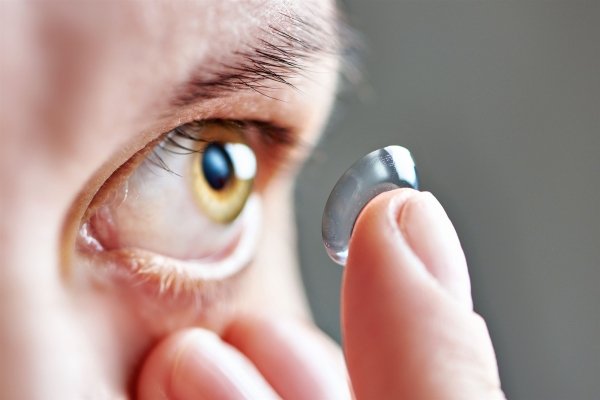The 5 Most Common Eye Injuries for Athletes
Sports and physical activities play a crucial role in maintaining a healthy lifestyle, but they also come with potential risks, including eye injuries

If you are suffering from Dry Eye, it is possible that your hormones are to blame. The hormones that are most likely to be responsible for Dry Eye are sex hormones, thyroid hormone and insulin.
Sex hormones
If you are a woman, due to estrogen and other sex hormone changes you are more likely to experience Dry Eye during different stages in your lifetime. Menopause, pregnancy and various oral contraceptive pills and hormone replacement therapy (HRT) can cause hormone changes triggering Dry Eye symptoms.
Thyroid hormone
Changes in the levels of your thyroid hormone can also cause Dry Eye. The changes can be a result of a thyroid-related autoimmune disease/disorder, such as Graves’ disease or Hashimoto’s disease for example.
Insulin
Since the changes in blood sugar level and insulin inefficiency can decrease the secretion of tears, a common eye problem in people who have diabetes is Dry Eye. If you have diabetes, the key to preventing dry eye is to control your blood sugar levels.
The process of ageing affects all parts of your body and the eyes are no exception. While people can suffer from Dry Eyes at any age, a majority of people over the age of 65 will usually experience some Dry Eye symptoms. This is because as we age, our bodies produce fewer oils and our tear production process often decreases, making our eyes more prone to Dry Eyes. Also as we age, often our eyelids become less effective at spreading tears over the surface of our eyes to keep them moist and lubricated.

Environmental factors such as sun exposure, wind, smoke, high altitude, dry climate, hot air and air conditioning can have a drying effect on your eyes.
Since our blink-rate tends to significantly drop when we are reading, writing, doing computer work, these type of activities that require visual concentration can be a cause of Dry Eye. Blinking less often also causes the tear to evaporate more quickly, which can result in uncomfortable dry eyes.

Contact lens wearers are more predisposed to dry eye syndrome, as many contact lens wearers complain of dryness, discomfort, grittiness, burning or foreign body sensation. This occurs because wearing a thin material covering the surface of your eyes can prevent oxygen from permeating the eyes. Additionally sometimes contacts lenses can interfere with the layer of tears on the eye’s surface causing the tears to evaporate faster. For these reasons, many contact lens wearers experience a mild burning or gritty feeling at the end of a long day of wearing contact lenses.

Since cigarette smoke contains over 7,000 chemicals which breaks down the thin protective tear film on the eyes, smokers are twice as likely to get Dry Eye compared to non-smokers.

Diuretics such as coffee and alcohol can dehydrate the body and can prevent your body’s tear production capabilities.

There are a number of over the counter and prescription medications that are thought to cause Dry Eye Syndrome. For example, some of the primary examples include certain acne medications, antidepressants, blood pressure-lowering drugs, Parkinson’s medications and sleeping pills.
Since the nerves under the surface of the eye are momentarily interrupted due to the laser process, some people experience dry eye symptoms for a few weeks after laser eye surgery. Fortunately, this type of Dry Eye is mild and these symptoms usually clear up after a few weeks once the corneae have fully recovered.
Dry eye and impaired tear function are often seen in people who have a vitamin A or vitamin D deficiency.
Vitamin A
Dry eye caused by a vitamin A deficiency is relatively easy to remedy, as Vitamin A is found in many foods including orange-coloured vegetables (eg carrots, pumpkin, kumara) and leafy green vegetables (eg spinach, broccoli).
Vitamin D
Various recent studies have shown a clear link between Dry Eye and vitamin D deficiency, due to its anti-inflammatory properties. In order to get the vitamin D that the body needs to prevent dry eye you need exposure to sunlight or you can take vitamin D supplements. Additionally, certain foods contain vitamin D, including fatty fish (eg salmon or tuna), beef liver, egg yolks, skiitake mushrooms, yoghurt and almond milk.

Symptoms of Dry Eye and allergies have many similarities. Furthermore, often those that suffer from Dry Eye can experience more severe symptoms and irritation due to allergies when the pollen count in the air is high, particularly during Spring and Autumn. Other airborne allergens including dust, pet dander and mould can also trigger dry eye symptom all year round for some patients.

The symptoms of Dry Eye can be brought on for a number of possible reasons, which can often be difficult to identify, isolate and eliminate in many cases. Rather than simply masking the symptoms with drops and other temporary measures, finding an effective treatment to provide effective long-term relief is key. There is where we come in!
Here at Auckland Eye’s Oasis Spa, you will receive a full clinical evaluation of the likely cause of your Dry Eye and be provided with a tailored treatment plan. Our aspiration is to give you the freedom to enjoy life without discomfort, and we are committed to providing luxurious, relaxing environment during your treatment.
Throughout your tailored treatment plan, you will have access to proven, state-of-the-art dry eye technology including LipiFlow Thermal Pulsation and Lumenis Optima IPL treatments, which will be delivered by our expertly trained clinical team, all from the comfort of our deluxe massage chair! If you are looking for effective relief from dry uncomfortable eyes from a premium provider, look no further!
Book your introductory assessment with our Dry Eye specialist team by emailing to oasisspa@aucklandeye.co.nz

Sports and physical activities play a crucial role in maintaining a healthy lifestyle, but they also come with potential risks, including eye injuries

For those leading an active lifestyle or engaged in sports, the significance of clear vision cannot be overstated.

Uncover the revolutionary technology behind LASIK that has empowered millions to enjoy clear vision without glasses.